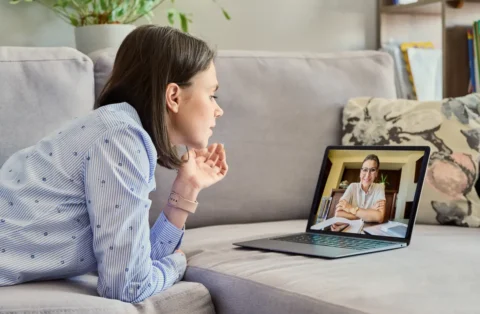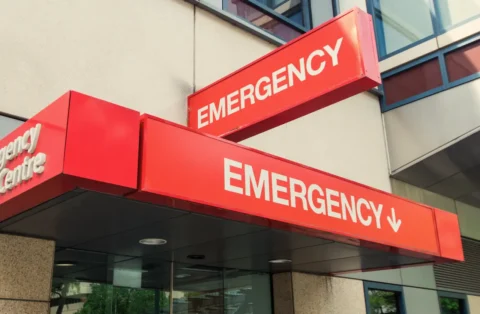What you’ll learn
We’ll explain what peer support groups are and how they can help patients living with substance use disorders. You’ll also get guidance on when it may be time to ask for help from professionals.
Living with substance use disorder can be a very isolating experience. You may feel like you’ve lost the ability to connect with others, even those closest to you, and that sense of detachment can make your symptoms of substance use disorder feel even heavier. Over time, that disconnection can deepen feelings of loneliness and hopelessness, making it harder to believe recovery is possible, but support is available, and you don’t have to face this alone.
If you ask anyone what the biggest benefit of peer support groups has been for them, the main answer you’ll hear is that it made them feel less alone in their journey through recovery.
Our Peer Support Groups can help you rebuild connection, find understanding among others who’ve walked a similar path, and gain encouragement that makes recovery feel not only possible, but sustainable.
When you hear about the experiences that others have had as they recover, and get a chance to share what you’ve gone through, you can receive one of the most important gifts of peer support groups: a feeling of community.
As you go through Medication-Assisted Treatment (MAT) here at QuickMD, you’ll get to experience firsthand the benefits of our peer support groups and how they can help you in your journey to recovery.
What are peer support groups?
A peer support group is a group of people who have shared life experiences, including substance use disorders, chronic illnesses, and mental health conditions.
One of the key benefits of peer support is that these groups meet regularly to speak openly about their experiences and offer tips, hope, and encouragement to one another in a safe place. These groups are judgment-free zones.
A study on the benefits of peer support groups in the treatment of dependency found that relapse rates dropped significantly from 24% to 7% for participants of these groups living in supportive housing. The advantages of support groups are great enough to boost the chances of achieving long-term recovery, which is why many programs offer them.
Advantages of peer support groups
If you’re thinking about participating in peer group sessions, but aren’t sure if they’re the right choice for you, here are some meaningful ways these groups can support you and meet your needs during your recovery process.
Reduced feelings of isolation
Recovery can seem lonely, and it’s easy for people living with substance use disorders to feel isolated from those around them. You may feel that you don’t belong, which can make the symptoms of your condition worse. Isolation can make depression feel worse, and sometimes people may turn to substances as a way of coping.
By participating in support groups, you can see that you’re not alone, and the feelings of hopelessness or low self-worth you might be experiencing don’t have to be weights you carry by yourself. That goes a long way toward easing anxiety and other uncomfortable symptoms.
Validation through shared experiences
You might go into recovery feeling that no one else has been through the same issues you have. This can leave you feeling like your experiences aren’t valid or that they’re not as significant as you may think.
That’s not the case. Joining a support group and talking about where you’ve been and how you feel can help you realize that while your experiences are unique to you, others have been there, too. Support groups can normalize everything you’ve been through so that you can face the experiences, while also helping to manage your condition.
Increased self-esteem and confidence
Support groups also allow you to start building confidence in your recovery. By seeing others dealing with the same issues and finding their way forward, you can learn how to heal, as well. You can also feel more empowered, which helps to grow your self-esteem.
Beyond sharing your own stories, peer support groups can also give you a forum to “pay it forward” to others who now stand where you once stood. If you’re further along in your recovery journey, you may see others taking their first steps. Being there to listen to them without judgment and tell your story can have a meaningful impact on that person’s life, too.
Hope and motivation
Hearing about the successes that others have had, even if they’re small ones, provides the motivation and hope you need to continue your own recovery. You’ll also get collective encouragement and support from other members of the group and your Peer Leaders. They will understand the road you’re on because they’ve walked it themselves, and you’ll be able to look to them for guidance on how to take accountability for your actions. In turn, this can motivate you to work hard to remain sober.
Safe, judgment-free environment
One of the most important benefits of peer support groups in the treatment of dependency is that you don’t have to worry about being judged for your actions. You can speak freely about every stumble on your path to recovery, knowing that everyone listening to you has gone through a similar experience. In this way, peer support groups work to decrease the stigma around substance use disorder and promote honest healing.
Peer support groups to support those experiencing dependency
Peer support groups can help with all manners of mental health concerns, but they are specifically beneficial for those dealing with substance use disorder. They provide a platform where you can learn about dependency from others who may be going through the same issues and connect with those who may be at a different stage of recovery.
Accountability is a cornerstone of peer support groups in the treatment of dependency. You’ll have regular meetings and shared goals that can assist you in remaining focused on your recovery. This encourages a sense of responsibility in your actions and choices that you may not have experienced before.
You’ll also receive emotional support from your peers. Living with dependency is complex and can involve both physical and emotional challenges. This condition is often prompted by mental health conditions that lead to substance use as a way to manage symptoms. Having a community that can listen and lend judgment-free support makes a big difference towards long-term recovery.
You’ll receive practical strategies and information to help you develop healthy coping skills, too. Because everyone in the support group will have gone through a variety of similar experiences, those who are further along in the recovery process can also give advice on what has helped them remain focused.
With peer support, you’ll also have access to other resources like important information for those in recovery, along with a variety of key services that can be instrumental in maintaining your sobriety.
When to get professional help
If you’re overwhelmed by substance use disorders, getting help from professionals as soon as you can is an important step towards getting better. With the right support, you have a chance to achieve long-term recovery while reducing your risk of experiencing a relapse.
Peer support groups can be highly effective either in person or online. Even if you don’t have access to reliable transportation or have health issues that prevent you from traveling, peer support groups are still a resource that can work for you. From the convenience of your home, you can join our peer support groups and get the support you need.
Here at QuickMD, our Peer Support Groups are for those in our MAT program. Because we’ve seen how effective having this type of assistance is while in active recovery, we make it our mission to offer as many resources as possible that you can turn to.
You can help yourself heal by joining peer support groups. We have a group that meets on Thursdays and is ready to welcome those who need guidance.




